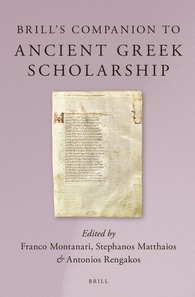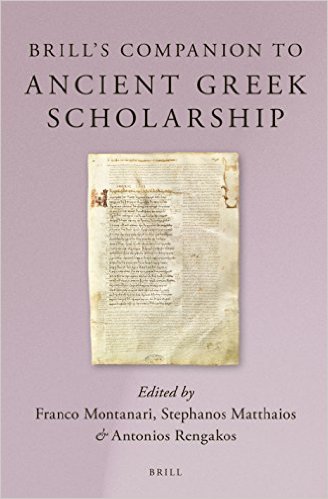 Brill’s Companion to Ancient Greek Scholarship, 2 vols, eds.
Brill’s Companion to Ancient Greek Scholarship, 2 vols, eds.
The NT was born in a Hellenistic and Jewish environment, but no matter how Jewish it was, it cannot escape its Hellenic influence. Moreover, the entire Western world owes its origins to Greek scholarship in various fields including philosophy, literature, mathematics, science, geography, and more. A comprehensive volume in ancient Greek scholarship is therefore needed and welcome.
Part 1 of these two volumes deals with the history of Greek scholarship in four periods: from its beginnings to Alexandria, Hellenistic scholarship, the imperial era and late antiquity, and the Byzantine Empire. These essays are both sweeping and detailed (e.g., the chapter on Hellenistic scholarship is 124 pages!), with helpful table of contents at the beginning of each essay. Even if one is not interested in all the topics in these essays, fascinating subjects such as the establishment of the “universal library” will pique the curiosity of scholars of antiquity.
Part 2 covers different disciplines in ancient Greek scholarship. The first essay provides all the major sources of our knowledge of ancient scholarship, categorized by topic (e.g., grammatical works, commentaries, lexica). The other chapters survey definitions of grammar and typology of philological writings, grammatical treatises, and lexicographical works.
Part 3 has three sections. The first contains some briefer essays on some specific literary and rhetorical techniques of ancient Greeks, such as ekdosis and the study of Homeric rhetoric. Nunlist also examines poetics and literary criticism within the framework of ancient Greek scholarship.
The second section of part 3 is the most helpful for biblical students, because it focuses on ancient grammar. This section includes essays on the constituent elements of the Greek language, language “correctness,” syntax, etymology, prosody, and orthography. The chapter on syntax is especially helpful since it overviews how ancient Greek grammarians studied syntax. Such information could help those who learn and teach Greek to better understand the language from the standpoint of those who spoke it.
The third section moves to interdisciplinary studies, highlighting those ancient Greek scholars who moved across various contexts. Biblical studies students again will be interested by the chapter on ancient Greek historiography, on the interface of philology and science, on geography, on philology itself, and on grammatical theory and its intersection with rhetoric.
Each of these articles is written from a teaching perspective. That is, knowledge is not assumed by and large. Some chapters begin with an overview of all the sources and authors to deal with. Some of the chapters even run over 100 pages, giving them ample space to include all the relevant details and cover all the sources, rather than picking and choosing only the most important ones. The back of the book includes a 160-page bibliography, a general index, and a very useful passage index.
Overall, this is not a book you would want to read straight through, but it acts as a superb reference work for all the various areas of ancient Greek scholarship. If you are acquainted with the Greek world, you will be familiar with much of the content in these chapters. But if you’re not, the authors help you along with a teaching-oriented style. Brill has compiled one of the best reference works on ancient Greek scholarship. It deserves a place on your shelf if you study ancient Greek, ancient philosophy, or ancient history. Admittedly, the price is prohibitive, but if you have any way to acquire it, you would be enriched.
Buy it here on Amazon.


